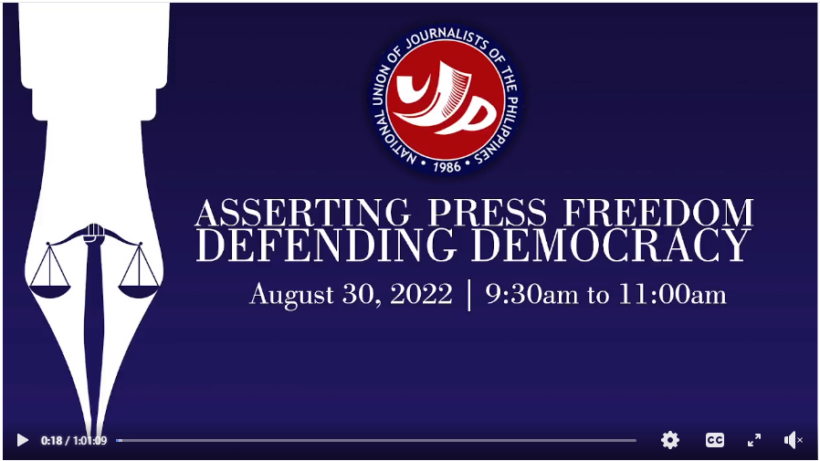The National Union of Journalists of the Philippines assailed the lack of accountability on the part of human rights violators that spurs a “culture of impunity” in the country.
“Lack of accountability over harassment and attacks makes further threats more likely and also creates a chilling effect on civil society,” NUJP wrote in an online declaration titled “Declaration of Commitment to Assert Press Freedom and Defend Democracy” on August 30, 2022.
“We commit to address and raise awareness of new cases of harassment and attacks in our sector and to monitor progress in pending investigations to ensure that these will not become mere statistics.”
Curtailing freedoms
Aside from being a state party to the International Covenant on Civil and Political Rights, the Philippines also promulgated a 1987 Constitution whose Bill of Rights guarantees the right to freedom of the press, speech and assembly. However, despite the constitutional and treaty guarantees, “concerted and continuing efforts to curtail these rights through violent dispersals of protests and activities, through the red-tagging and harassment of journalists, activists, legal practitioners and rights defenders, and through outright attacks on them” persisted, according to NUJP.
“Accountability for these attacks is rare….”
“This lack of accountability adds to a culture of impunity that affects civil society, media, the academe and the legal profession.”
NUJP vowed to pursue its campaign against “the culture of impunity.”
Journalists have the duty to assert their right to free press “through assertion and practice,” NUJP stated.
National Press Freedom Day
Commemorating “National Press Freedom Day” for the first time on August 30th, 2022, NUJP issued its online declaration urging members of the international community to sign “to show support for our fight for press freedom.”
A Philippine law, Republic Act 11699, declared August 30 of every year as National Press Freedom Day. The law directs government agencies to organize, in consultation with the media sector, “consciousness-raising activities on the importance of the press, their rights and social responsibilities and the elimination of all forms of violence against the press.”
August 30 marks the birth anniversary of Filipino lawyer and journalist Marcelo H. del Pilar who founded Diariong Tagalog (1882) and served as editor of La Solidaridad (1889) that fought abuses and sought reforms during the Spanish colonial era in the Philippines.
Libel
NUJP bewailed libel as “a threat to press freedom and freedom of expression for decades.” Urging congress to decriminalize libel, NUJP asserted that libel laws threaten press freedom, especially with increased penalties under the Cybercrime Prevention Act of 2012.
“There has been a rise in the number of libel complaints filed against journalists, particularly during the pandemic lockdowns of 2020 and 2021,” NUJP observed, “as well as in the use of legal and regulatory processes — sometimes called lawfare — to hamper media from doing its work as a watchdog on power and as a forum for public criticism and compromise.” The group noted that libel has been used not only against journalists but “legal and registered civil society organizations and individuals” as well. The law was used to stifle “legitimate comment and criticism of pandemic response and other policies.”
Ethics
At the same time, NUJP encouraged journalists to adhere to the Journalist’s Code of Ethics which sets them apart from other “content creators.”
“Media organizations, newsrooms and individual media workers must work together to empower journalists to adhere to the code of ethics and to Philippine laws to maintain the credibility of the profession and to help protect them from suits and other legal problems.”
In November 2021, NUJP came up with the Ethical Guide for Filipino Journalists.
Harassment suits
Condemning legal suits “to harass and silence journalists,” NUJP urged the people to “stand in solidarity with journalists facing harassment suits and recognize that individual cases have an effect on the media community and on society in general.”
Instead of harassment suits, NUJP proposed that alternative dispute resolution coupled with self-regulation and correction on the part of media practitioners be adopted.
Anti-terror law
The Philippine media sector has expressed concern over section 9 of the Anti-Terrorism Act, citing that its provision “could make media practitioners vulnerable to wrongful charges and arrests, producing a chilling effect on all media practice.” Recently, government tried to block the websites of Bulatlat.com and Pinoy Weekly. NUJP accused “the National Security Council and the National Telecommunications Commission” of allegedly having “misused the Anti-Terrorism Act without affording media outfits and progressive groups notice or hearing.” For backgrounders, see Gagged, red-tagged: Journalists push back.
Mutual support
NUJP called upon journalists, legal professionals, rights defenders, the academe, artists and civil society for “increased engagement” in defending human rights as “a common cause.”
“We commit to stand up for and support each other when the rights of the communities we serve are under threat or attack and when we ourselves are under attack in connection with the defense of those rights.”
Solidarity
NUJP called for international solidarity and support for the journalists’ assertion of their right to freedom of speech, of expression, and of the press “by practice.”
“The community of independent journalists has managed to continue doing its job despite challenges and attempts to discredit and weaken it because of the media workers and newsrooms who have refused to succumb to pressure.”
“Journalists must assert press freedom by reporting despite the threats and harassment and the media community must provide them the support and solidarity that will help them to continue to do so,” NUJP added.












